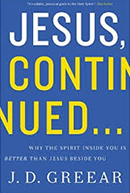
Mega-church pastor J.D. Greear has been quietly amassing influence among conservative evangelicals. Now he’s trying to stirring them up with a new book on the Holy Spirit. – Image courtesy of J.D. Greearaul
Pastor J.D. Greear may be one of the most influential pastors you’ve never heard of. He’s not preaching prosperity on television or advising the President. He’s never made the “TIME 100” or The New York Times bestsellers list. But Greear has built a massive, multi-campus megachurch amid the modest city of Raleigh, North Carolina, and he is quietly amassing influence among conservative evangelicals.
The subtitle of his most recent book, “Jesus Continued…: Why the Spirit Inside of You is Better Than the Jesus Beside You,” caught my attention, and I decided to invite him to discuss the idea at “On Faith and Culture.” Here we discuss how he thinks some of his fellow Christians have misunderstood the Holy Spirit and how he hopes they’ll change.
RNS: You say you felt disconnected from God during most of your Christian life. This is an unusual and refreshing admission for a pastor. Tell us more.
JDG: Even though I’d been pastoring a “successful” church, God seemed distant—more like a doctrine I knew about than a person I knew. My relationship with God seemed one-way. I worked for Him. Jesus was like a teacher who had given an assignment and then stepped out of the room, leaving me to learn the lessons and finish the assignment. I prayed to Him about my problems and tried to trust that He was working—somewhere, somehow—to help me. But I didn’t have any real interaction with him.
I knew the Holy Spirit was inside me, but I related to Him the same way I relate to my pituitary gland: I’m grateful it’s in there; I know it’s essential for something; I would never want to lose it . . . but I don’t interact with it. There was little, if any, sense of experiencing the presence of God as moving, dynamic Person.
RNS: Tell me about relating to God more as a doctrine than a person. You’re Southern Baptist, and that denomination is famous for drawing doctrinal lines in the sand as well as being highly skeptical of experience in theological formation. What am I missing?
JDG: I never want to downplay the important role of doctrine, but Christianity is more than doctrine. It is relationship and experience that grows out of doctrine. We can never know God apart from Scripture, but knowing Scripture isn’t the same as knowing God. Without doctrine, we have no way of interpreting our experiences; but without experience, our doctrine has no point.
To “grow in the gospel” is not simply to grow in our awareness of God’s love, or even in our response to those truths. Presence is the point of Christianity. The Holy Spirit speaks in 36 of the 59 places He shows up in the book of Acts. The “normal” Christian life includes awareness of a moving, speaking Person in the midst of the church.
RNS: You lament that too many people think of “Christianity as a lifestyle to which we conform.” But you’re evangelical—an often pietistic tradition that places heavy emphasis on whether one drinks alcohol, does their “quiet time” regularly, attends church, etc. Even your preaching seems to place a heavy emphasis on lifestyle changes. How do you rectify this?
JDG: Following Jesus does lead to radical lifestyle changes, but too many Christians think of Christianity as just lifestyle changes. Change is the fruit of walking with Jesus, not the core. Sadly, many Christians have adopted the lifestyle without the relationship. And that’s tragic. Because apart from the relationship, we find no joy in the lifestyle.
Of course, any knowledge of God that doesn’t lead to lifestyle changes isn’t a genuine experience with God. When Moses met with God on Mount Sinai, his faced literally glowed for days as a result (Exodus 34:29–35). As we behold the glory of God in Christ, Paul says, we are transformed from one degree of glory to another—which includes lifestyle changes—made possible by the Holy Spirit (2 Cor 3:18).
RNS: You juxtapose “the Spirit inside you” with the “Jesus beside you.” But Christianity is a monotheistic religion in which Jesus and the Spirit are the same God. Explain how this works.
JDG: Before His ascension to heaven, Jesus told his disciples, “I will not leave you as orphans. I will come to you” (John 14:18). In the Spirit’s coming to them, He was coming to them. Such is the nature of the one God, existing in three persons. When you experience one, you experience all three.
In saying, “the Spirit inside you is better than Jesus beside you,” I’m just rephrasing a promise Jesus made: “It is to your advantage that I go away, for if I do not go away, the Helper will not come to you.” (John 16:7). Had the disciples understood what was being offered to them, they would’ve been glad Jesus was leaving if that meant getting the Spirit. Having the Spirit in them would be better than having Jesus’ bodily presence beside them.
RNS: How can non-charismatic Christians improve the way they understand and experience the Holy Spirit?
JDG: They can understand that God has always desired to be present with his people. He walked with Adam and Eve each evening in the Garden. He led his people in Exodus by a pillar of cloud and fire. God could have led them another way, but He wanted to be with them. The Israelites even gave God the name “Jehovah Shammah” or “the God who is there” (Ezekiel 48:35). He came to earth as “Immanuel” or “God with us” and now through the Holy Spirit, God is closer than ever—God in us.
The Holy Spirit is God’s very presence—a dynamic presence that moves and speaks. God hasn’t changed in our day.






